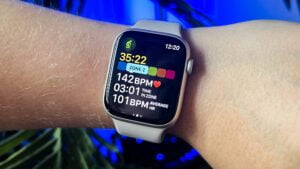ButSpeak.com
News which Matters.

A new study highlights the complex effects of Apple Watches on AFib patients, showing both benefits in safety and concerns over increased anxiety and healthcare use.
A recent study has shed light on the complicated relationship between wearable technology, specifically Apple Watches, and patients with atrial fibrillation (AFib). While these devices are increasingly popular for heart monitoring, the study reveals that they can have both positive and negative effects on those experiencing irregular heartbeats.
The study found that while some AFib patients reported feeling reassured by wearing their Apple Watches, others experienced heightened anxiety, excessive symptom monitoring, and more frequent doctor visits. The ability to monitor heart rhythms in real-time provided comfort for some, yet for others, the constant alerts and notifications triggered intense fear. In fact, 20% of those who received an irregular rhythm notification, likely indicative of AFib, reported experiencing significant anxiety.
These findings highlight the double-edged nature of wearable technology. On one hand, these devices offer the potential for early detection of serious heart rhythm issues, which could be life-saving. Dr. Dasgupta, a contributor to the study, emphasized that this potential benefit should not be overlooked, despite the associated risks.
On the other hand, the study revealed that AFib patients who use smartwatches, like the Apple Watch, often experience more symptoms and concerns compared to those who do not use such devices. This raises important questions about the psychological impact of constant health monitoring and whether it might lead to unnecessary stress and healthcare utilization.
Lindsay Rosman, PhD, the study’s lead author, pointed out the need for further research to fully understand the effects of wearables on patients’ health and well-being. “Given the significant increase in use of wearable devices in this patient group (and the population in general), we believe prospective studies and randomized trials are needed to understand the net effects of wearables – including their alerts – on patients’ healthcare use and psychological well-being, as well as the downstream effects on providers, hospitals, and health systems,” she said in a statement.
As wearable technology continues to evolve and become more integrated into healthcare practices, it remains a valuable tool for those with conditions like atrial fibrillation. However, this study underscores the importance of balancing the benefits of early detection with the potential psychological risks. For some patients, these devices may be a source of comfort, while for others, they may cause more harm than good. The ongoing challenge for healthcare providers is to determine how best to use these technologies to support patient health without exacerbating anxiety or stress.